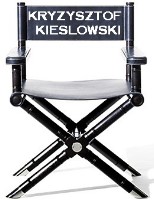 |
 |
With a shrewd story-telling talent Polish director Krzysztof Kieslowski
expanded from socially-conscious
political documentaries to a cinema exploring the breadth of emotional
disillusionment, desire and co-existence. Episodes of chance,
paradoxical circumstance and mysterious interconnectivities figure
prominently in his signature style. Loosely basing his work
in
thematic representations of the ten commandments, the nationalistic symbology of "Le drapeau tricolore" or
simply satire on communist propaganda,
Kieslowski's film language encourages metaphysical celebrations of intuition
and the power of fatalism with his use of specific camera framing and
movement, extended pauses and precise use of musical interludes. Frequently
recognized as the major cinema presence of the 90's his relatively small oeuvre has developed a flourishing niche
of enthusiastic academia and devoted cineastes. |
|
Suggested Reading
(click cover or title for more
info)

The Films of Krzysztof Kieslowski: The Liminal Image
by Joseph G. Kickasola |
Kieslowski-Cinema website
Director - Feature filmography and DVDBeaver links:
Trois couleurs: Rouge (1994),
Trois couleurs:
Blanc (1994),
Trois couleurs: Bleu (1993),
The Double Life of Veronique
(1991) "Dekalog" (1989), (mini) including
A Short Film About Killing
(1988/I),
A Short Film About Love (1988), Seven Days a Week (1988),
Blind
Chance (1987),
No End (1985), The Calm (1980), Railway Station (1980),
Camera Buff (1979),
The Scar (1976) |


